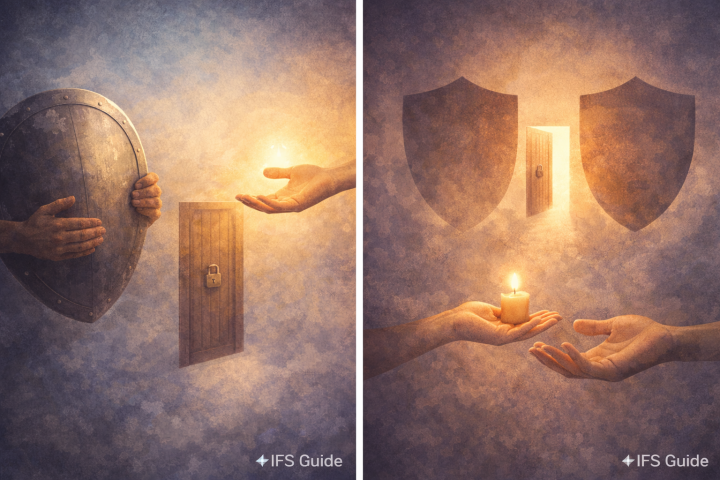Common Protectors' Fears


Common Protector Fears in IFS (and How to Gently Work With Them)
In Internal Family Systems (IFS) therapy, common Protector fears often arise when these Parts feel their roles are threatened. We believe that our protective system is there for a good reason, to protect us from our own vulnerabilities! Our Protectors have learned how to manage and keep away these vulnerabilities because when they have come up to the surface, in the past, everything has gone wrong. These vulnerable parts are called Exiles. So a Protector fears that what happened in the past, may happen again and the pain associated with the Exile may overwhelm us.
Before diving in, you might want to take a look at the Related articles:
• Meeting Protectors in IFS
• What Are Exiles in IFS Therapy?
So, What are Protector fears?
What Protectors don’t usually know is that there is a Self that can take care of those vulnerabilities and even help them unload all of their extreme beliefs. Since the protectors have been doing their job for so long, and they don’t know any other way, they can be very hesitant to allow the Self to get closer to the vulnerable Exile. Also, they just met the Self, so how will they know it is safe to trust it?!
When we address our Protector’s fears, offer hope, and negotiate with them for safe ways to get to that Exile, they often relax and give us the space. Here are some common fears and some insight on how to address them and offer hope.
1. “The Exile's pain is too much; you will not be able to handle it.”
One of the most common Protector fears we face in IFS therapy is that the Exile will take over the system and overwhelm you. One of the things that makes parts-work so powerful is being a witness to our parts’ feelings and emotions. We can ask any part to go slower and softer on how they communicate those emotions so that we can better understand them.
Parts are eager to be heard and understood, so sometimes they throw everything at you once you notice them, to make sure that you really hear them. Using IFS negotiation techniques, we can check with them and see if it is okay to go slower and turn the volume of the intensity lower. This will allow us, in return, to be fully present for them for as long as they need. This volume adjustment can be negotiated, it can be loud enough so the Exile feels connected to you, and low enough so you can still be present with it.
2. “My pain has become a part of my identity and it is impossible to change it now”
Another challenge that often comes up in IFS therapy is that the Protector fears that therapy will be fruitless because our pain and trauma has become internalized as part of our identity. Protectors don’t know that our Parts are not their burdens.
These extreme beliefs and intense emotions that Exiles carry have been imposed on them and we can help them release them. We can let them know about this capacity that the Self has, offering hope of unloading the pain and healing the extreme beliefs to have a healthier and happier life moving forward.
3. “This Exile will get judged and then it will be even more hurt”
Protectors are afraid of these vulnerabilities being reinforced by external (or internal!) judgement.
One of the advantages of IFS therapy is that there is no need for the wounded part to share this vulnerability with the external environment if it doesn’t feel safe. Remind them that you do not need to share those secrets with anyone else, this is between the Self and the inner system, they can decide together what to do with that secret later.
Also, reassure and acknowledge that there are other parts in the system that might judge and criticize, but you (in your Self) can work with any of them if they ever get triggered. Sometimes, it might feel safer to heal those Parts that hold judgment first.
4. “If we heal the Exile I will no longer be needed, what will I do?”
Protectors might fear that we might want them out of the system or that they will not be helpful anymore. The IFS method recommends that we let them know that our goal is not to eliminate Parts but instead to help them find their original non-extreme roles. All Parts have inherent worth and gifts and provide Self with important input for your healthy functioning and well-being.

5. “Feeling all the pain and vulnerability of an Exile will trigger dangerous Parts!”
Another common Protector fear is that other Parts may take over the system and put you in danger. Acknowledge that this is possible and that you can get to know and/or heal those Parts that can be dangerous to yourself first! Also, remind them that those dangerous Parts are also protecting Exiles, and that connecting to these Exiles from Self is calming, not escalating.
6. “By releasing those negative beliefs and emotions, I will change and may need to change everything around me, including my relationships!”
During the IFS therapy session, you may feel that Protectors are afraid that the external environment will not be able to adjust to the inner changes. Acknowledge that this is a possibility, that releasing the pain and vulnerabilities that you hold will create inner changes.
Let them know that you can decide together later whether to make external changes or not. You can go one step at a time, and nothing has to change externally if it doesn’t feel safe, the change can be just in the way you handle things from now on.
7. “This system doesn’t have a Self; I don’t see it!”
Some Parts have never met Self; therefore, they believe there is no Self. Share with this Part that since the beginning of IFS they have never found anyone that doesn’t have a Self, they actually have found that Self cannot be damaged nor destroyed!
The Self is never missing, it has just been obscured and if Parts relax it will emerge naturally. Maybe share how you have been – even if only for a split of a second – compassionate, curious, creative, or any other of the qualities of the Self in the past.
8. “Being confident and courageous is dangerous, we need that vulnerability!”
Our Protectors remember previous experiences of Self-energy attracting negative attention or being punished. Based on previous experiences they believe that being in Self is dangerous!
We can reassure those Parts that the Self is safe now, in this specific moment. We can honor their previous experiences and go very slowly so it feels safe to continue, it can be progressive.
Also, IFS experts suggest offering some testing or experiments: “try it for 30 seconds and if it is not safe come back straight away” or “you don’t need to relax 100%, maybe just 50%, so you can see how it feels”, “you can stay close.”
9. “If we heal and I stop doing this job people will do whatever they want with us!”
Protectors might be afraid that healing will mean having no boundaries and people will take advantage of that.
Reassure them that this is not the goal of IFS therapy. As the wounded parts are healing, your boundaries become clearer and we are able to confidently step away.
Remind it that you do not want for this Protector to stop doing what it does, it can work as a valuable team member with the Self instead of working relentlessly on its own.
10. “How is it even possible to heal? The pain will always come back!”
It is hard for Protectors to understand that healing is possible, they don’t know any better!
We can offer some hope showing them how IFS therapy has worked with other Parts in the system.
Also, acknowledge that this vulnerability might need more attention and might be harder to heal, but “what if we try it out to see what happens?” Remind them that the Self will still be there to keep helping the inner system afterwards.
Conclusion
These are some of the most common Protector fears people encounter during their IFS journey. Rather than fighting these fears, it’s important to remember that Protectors are trying to help in the only way they know how.
Even when a fear feels irrational to us, it feels completely real to the part holding it. The most effective approach is to acknowledge the fear, appreciate the Protector’s intention, reassure it that Self is present, and move at a pace that feels safe for the whole system.
If you’d like to explore this further, you may find it helpful to read our article “Meeting Protectors.”
FAQ
A: Common Protector fears in IFS therapy include fears that the pain of Exiles (vulnerable parts) will overwhelm the system, that healing will render the Protectors unnecessary, and concerns that change might lead to instability or new vulnerabilities.
A: IFS therapy addresses Protectors’ fears by negotiating with them to allow safe access to Exiles, reassuring them of the presence and capabilities of the Self, and providing hope for unloading extreme beliefs and healing the system.
A: In IFS therapy, it is acknowledged that the pain of an Exile can feel overwhelming, but the process includes techniques such as asking parts to slow down and reduce the intensity of their communications, which helps in managing this pain more effectively.
A: If a Protector fears change, IFS therapy helps by ensuring that changes are manageable and incremental, and that the Protector can still play a valuable role in the system, thereby maintaining a sense of purpose and involvement.
A: According to IFS, every system has a Self, and no evidence has been found of a person without a Self. The Self might be obscured but is never absent, and it can emerge naturally once other parts relax.
A: IFS therapy reassures Protectors that their role will not become obsolete. Instead, their roles are transformed to support the system in healthier ways, contributing positively without the extreme behaviors previously needed to protect vulnerabilities.
Monthly IFS Workshops & Challenges!
Every month we organize online workshops to help you get a deeper understanding of IFS!
